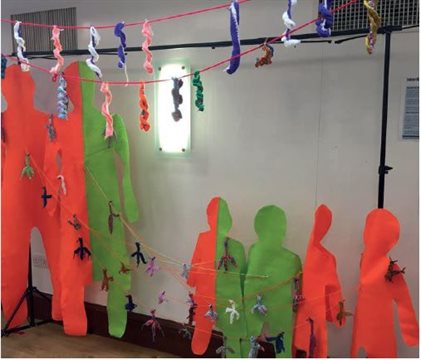Knitted Genetic Landscape: family communication of genetic risk information
Knitted Genetic Landscape was created through ‘yarn bombing’to raise awareness of inherited genetic conditions and the challenges that families face in communicating genetic risk information totheir children.
 ‘Yarn bombing’ is a cultural artistic practice in which urban knitters or yarn bombers use colourful knitted displays and handmade amigurumi (knitted figures) to tell a story or heighten awareness of a political or cultural issue or event, in this case inherited genetic conditions.
‘Yarn bombing’ is a cultural artistic practice in which urban knitters or yarn bombers use colourful knitted displays and handmade amigurumi (knitted figures) to tell a story or heighten awareness of a political or cultural issue or event, in this case inherited genetic conditions.
Research with families affected by or at risk from inherited genetic conditions has found that while parents are keen to talk to their children about the genetic condition in their family and its risk, they often lack the words, confidence and knowledge to do so. This leads them to delay the disclosure that can cause family tensions. In some families, children and young people who know about a genetic condition affecting their family do not know how to start conversations about it, or are frightened to ask questions, for fear of upsetting their parents. The project team set out to create a fun and engaging activity for families affected by or at risk from inherited genetic conditions that would help to initiate conversations about genetic risk and intrigue and engage the wider public in genetics.
The knitted genetic landscape was part of a day-long event at King’s in which experiences of coping with inherited genetic conditions could be heard, promoting academic debate and a creative and dynamic public dialogue. The project team created and displayed a life-sized genogram (a representation of a family tree that also displays hereditary patterns), to which crochet DNA and finger-knitted chromosomes were attached. The crochet DNA were posted to the creative team ahead of the installation from people with genetic conditions. Artist Clare Sams hosted a finger-knitting workshop during which participants made knitted chromosomes to attach to the genogram to create a growing and dynamic knitted genetic landscape. The activity was supplemented by arts and crafts activities such as colouring genograms, modelling chromosomes and, in a stand led by the Biomedical Research Centre, making chromosomes from sweets. The event also featured a genetic photographic gallery, including a print of Rosalind Franklin’s Photo 51 and a short scientific film on chromosomes and DNA. Genetic counsellors and charities provided information, advice and support to families and other visitors throughout the programme.
During the project, children and young adolescents told the team that they wanted to talk to their parents about their genetic condition, but wanted to do so while doing activities. The arts activities and knitted genetic landscape this project provided enabled families to discuss their genetic condition in a safe environment and supported wider learning about inherited genetic conditions.
Project feedback
The knitted genetic landscape was a safe space in which families could come and start or continue their conversations about a genetic condition in their family. The programme demonstrated how important creative activities are for initiating conversations and talking through challenging topics. We have since developed multi-family discussion groups which use creative activities to support conversations, build resilience and develop coping strategies for families affected by genetic conditions.
Dr Emma Rowland, academic lead
The three strands of the project were devised to unify in a day of family education, information, and support. It was enjoyable to work alongside scientists and cultural researchers to develop and plan the project, and proved to be a valuable learning experience too… There were family-oriented activities during the event, including making corn chromosome pictures, which were popular with children and adults alike. These activities promoted discussion on the subject of inherited genetic disease in a safe and enjoyable environment.
Clare Sams, artistic lead
I told a friend about the project as she has a child with translocation Down syndrome which, although rare, is hereditary. She took her mum and three children there on the way back from a hospital appointment and said she just felt like her family was represented and celebrated in this art display. She made a piece of finger knitting and she still has it hung in her kitchen.
Nicola, project participant
Project Team
Dr Emma Rowland
Emma Rowland is a Health Geographer working in the Florence Nightingale Faculty of Nursing and Midwifery at King’s College London. Her PhD research focused on the emotional geographies of care work in the NHS, specifically exploring how spatial and temporal dimensions of care affect the emotional well-being of health professionals and patients delivering and receiving care. Current research focuses on the development of psycho-educational interventions to support families affected or at risk from inherited genetic conditions to talk to their children about genetic risk. It is hoped that these interventions will enhance family function and the emotional well-being of all family members.
Clare Sams, artist and educator
Clare Sams’ arts practice is centred on textiles, using knit and crochet to document modern life. The topics are often focused on the fringes of society, and looks at themes of home and belonging, love and loss, consumerism and waste. The uncomfortable subject matter is softened by the use of the familiar comfort of soft yarn, creating a warmth and familiarity for the audience.Clare uses her art as a way to engage with communities, practicing in galleries, museums, arts events, colleges and schools.
Family communication of genetic of risk information: A knitted genetic landscape is a collaboration between with the Florence Nightingale Faculty of Nursing and Midwifery at King's College London and artist Clare Sams. It was supported by the university's Culture team.